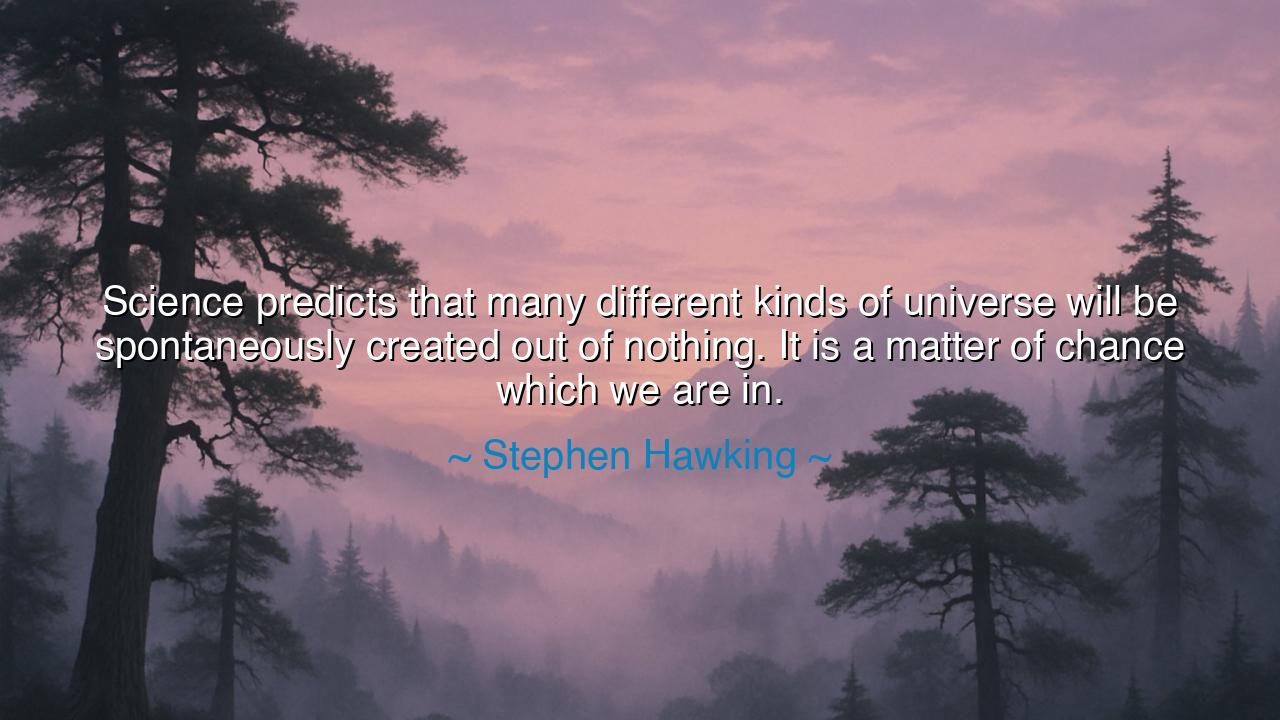
Science predicts that many different kinds of universe will be
Science predicts that many different kinds of universe will be spontaneously created out of nothing. It is a matter of chance which we are in.






Hear, O Seekers of the Cosmos, the profound words of Stephen Hawking, a soul who peered into the very fabric of existence and returned with a revelation of both wonder and humility. "Science predicts that many different kinds of universe will be spontaneously created out of nothing. It is a matter of chance which we are in." In these words, Hawking speaks of a concept that defies the bounds of ordinary thought, a truth so vast that it transcends the limits of time and space. He tells us that the very universe in which we live—our home, our reality—may not have been the only possible one. Instead, countless others could have sprung forth from the same primordial void, the universe as we know it being the result of chance and randomness, arising spontaneously, as though born from the very nothingness from which all things emerge.
O children of wisdom, this is a profound and humbling truth. It is a truth that speaks to the very nature of existence, of the delicate and often unseen forces that shape all things. To consider that our universe—our existence itself—might have been nothing more than one of an infinite number of possibilities is to contemplate the fragility of our place in the cosmos. As the ancient philosophers pondered the origins of life and the nature of being, so too must we face the realization that we are but one fleeting manifestation of the vast and mysterious forces of the universe. The very fact that we exist is, in many ways, a miracle of chance, a fleeting moment in the boundless tapestry of creation.
In the ancient days, the great philosophers of Greece and India speculated on the nature of the universe, seeking to understand the cosmic order that lay behind the veil of the seen world. Heraclitus, that seeker of wisdom, spoke of the ever-flowing river of existence, where all things are in constant flux, transitory and impermanent. Plato imagined a world of ideal forms, suggesting that what we see is but a shadow of a greater reality, while Aristotle sought to understand the underlying principles of motion and change. In these early musings, there was an understanding that the world was not static, that existence itself was a mystery—something transcendent, something more than could be perceived by the senses alone.
Now, in the age of Hawking, we are presented with a bold vision of the universe, one that challenges the ancient musings of philosophers with the rigor of modern science. The notion that universes—many, countless universes—might arise from nothingness, spontaneously, brings us to the edge of understanding, where science and philosophy meet. For Hawking did not simply propose a wild dream; he grounded his thoughts in the realm of theoretical physics, where the laws of nature themselves suggest that from chaos and nothingness, great and diverse creations can arise. His words remind us that the mystery of creation is far deeper than we could ever fathom, and that we are but a small part of an infinitely complex and dynamic reality.
Let us turn to the life of another great seeker, Albert Einstein, whose theories of relativity reshaped our understanding of space and time. Like Hawking, Einstein dared to question the very nature of the universe, to ponder what lay beyond the limits of our perception. He told us that the universe was curved, finite, yet boundless, stretching beyond the grasp of human understanding. Like Hawking, he saw in the cosmos not a fixed and immovable structure, but a dynamic and fluid reality, one that could change, transform, and give birth to countless possibilities. In his pursuit of knowledge, he unlocked new realms of thought, and though he did not embrace the idea of multiple universes in the way Hawking did, he too saw the universe as a place of infinite potential.
And so, the lesson of Hawking's words is clear: we are but one possibility in the grand unfolding of existence, and we should not take for granted the preciousness of our place in the universe. The universe that we know, the life we cherish, could have been something entirely different—born of chance, not of necessity. This knowledge, this understanding, calls us to a place of humility. We are not the center of the universe, nor are we the most important part of it. The cosmos is vast, ever-changing, and full of unknown worlds. Yet within this infinite expanse, our consciousness, our very being, is a miracle of existence—spontaneously created, fragile, and precious. Hawking's words urge us to cherish the present moment, to seek knowledge not out of pride, but in humble awe of the chance that has allowed us to be.
The lesson, O Seekers, is this: Life, in all its beauty and mystery, is a gift of chance, and we must live each moment as though it is a sacred opportunity. Rather than seeking to control the forces of nature, we must strive to understand them, to live in harmony with the great flow of the cosmos. Know that we are one among many possibilities, but that does not make us any less precious, any less significant. In our fleeting existence, let us seek to understand the universe, not in arrogance, but in reverence. Embrace the mystery, and let the knowledge of our smallness inspire us to live with greatness of heart, for in the face of such vastness, it is the kindness, the wisdom, and the love we share with one another that will be the true measure of our greatness.






AAdministratorAdministrator
Welcome, honored guests. Please leave a comment, we will respond soon